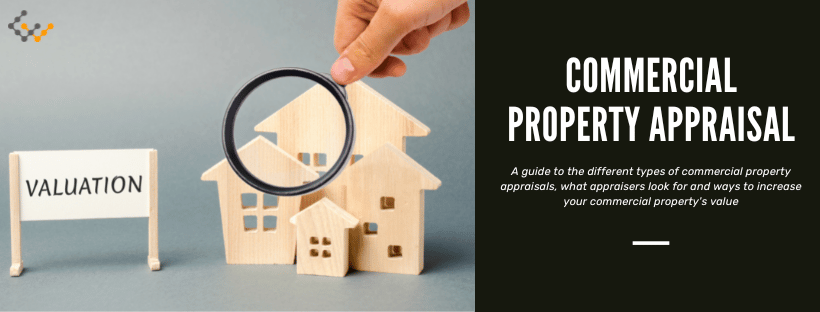What is a Commercial Property Appraisal? What Does it Cost?

Accurately assessing a commercial real estate property’s value is essential for multiple reasons. Buyers, sellers, lenders, and tax authorities all need to know how much a property is worth, so they can accurately price, underwrite and tax the property. Getting a commercial property appraisal is the industry-standard way to value commercial real estate properties.
What is a Commercial Property Appraisal?
The role of a commercial property appraisal is to accurately value investment property. This is most often an income-generating property but could be raw land that’s held for investment.
The appraisal is considered an objective value assessment, as it’s conducted by a qualified third-party appraiser.
Types of Commercial Property Appraisals
Commercial property appraisals can be conducted on multifamily housing, office buildings, industrial sites, retail stores and malls, institutional properties, raw land, and more. Virtually any investment property not held for personal use can be valued by a commercial appraisal.
Because investment properties are primarily held for their income/appreciation potential, many types of commercial building appraisals focus on potential earnings/return. Some other methods can also be used, though. The most common commercial building appraisal types are:
Answer a few questions and get custom mortgage quotes. We'll match you with offers from our network of 650+ lenders.
Cost Approach
Bases a property’s value on the cost of rebuilding the property. Factors such as land, materials, and labor are weighed heavily, and a fairly standard formula is used. The following formula is used to calculate the property value:
Property Value = land cost + cost of new build – accumulated depreciation.
This method isn’t commonly used. It’s often considered unsuitable for older properties since they’ve depreciated and building costs have risen since original construction. The method might be used for newer properties, however, since their building costs likely haven’t changed too much.
Income Approach
Bases a property’s value on its potential earnings and cost. Factors such as net operating income (NOI) and capitalization rate are weighed heavily, with a standard formula being: Property Value = NOI / cap rate.
This is one of the most common ways to calculate commercial property value, partly because it’s considered one of the most accurate. So long as the cap rate used is accurate (which requires comps’ cap rates), the valuation should be accurate.
Market Approach
Also termed the sales comparison approach. Bases value on sales prices of comparable properties, and general market conditions.
This method is commonly used for residential real estate, but not so much for commercial real estate. Similar comps aren’t always available for investment properties.
Gross Rent Multiplier Approach
Bases a property’s value on the rents of comparable properties. This method is similar to the market approach, except it substitutes gross rents for the sales price. Gross rents and valuations of comps can be used as a ratio for valuing a property based on its rents.
This method is less frequently used for the same reason that the market approach isn’t widely used. Finding accurate comps can be difficult.
Value Per Door Approach
Bases a property’s value on the number of units, and the projected value of each unit.
This method is typically used for multifamily housing or similar properties, as most units within a property are similar and thus have similar values.
Value Per Rentable Square Foot Approach
Bases a property’s value on the square footage that can be rented, and the projected value of each square foot. Non-rentable space isn’t included since it doesn’t generate income.This method can be used for non-multifamily properties, as square footage is consistent even when rented spaces aren’t the same.
Why is an Appraisal Important for Commercial Real Estate?
Commercial real estate appraisals are used because they’re third-party assessments by qualified professionals. Thus, they’re generally considered accurate and unbiased. Appraisals fairly calculate the value of a property, according to one of the aforementioned methods.
An appraisal might be ordered by several different stakeholders, each of which has its own purposes for the appraisal. An appraisal might be used by:
- Lenders when underwriting a property’s primary or secondary financing
- Sellers when pricing a property’s listing, considering offers, and countering offers
- Buyers when placing offers and considering counter-offers
- Owners/Investors when considering purchase, sale or renovation
- Owners and lessees when negotiating lease rates
- Governments when seizing property via eminent domain
- Governments when conducting tax assessments
- Owners when appealing tax assessments
- Insurance companies when assessing damage and claims amount
What Do Appraisers Look for in a Property? 6 Things
The factors that commercial property appraisers look at when valuing properties depend on the valuation method. Some factors that appraisers might look at include the following:
- Property location and local commercial real estate market
- Property building costs (including labor and materials), and age
- Property square footage, and number of units
- Revenue per square foot, per unit, and in total
- Net operating income
- Comparable properties’ values, revenues and cap rates
5 Ways to Increase Your Commercial Property’s Value
Increases in local commercial property values will increase your particular property’s value, as a rising tide lifts all commercial properties. Thus, it’s important to consider the current and projected local conditions when initially investing in a property.
Once investors have a property, they might increase its value by one or more of the following:
- Attracting new tenants that pay higher rents
- Increasing rents when renewing leases with current tenants
- Renovating current spaces, systems and/or features
- Adding more space and/or features
- Reducing operating expenses (so net operating income increases)
The best ways to raise your property’s value depend on the property itself. You’ll have to make these determinations.
How Much Does a Commercial Property Appraisal Cost?
How much a commercial property appraisal costs varies, as appraisals differ in complexity.
The method used, available data (e.g. comps), property’s uniqueness, property’s value and other factors can increase or decrease cost. In general, expect to spend $1,000s for a commercial building appraisal cost. Some more complex ones may reach $10,000+.
Commercial vs. Residential Appraising: What’s the Difference?
Commercial appraisals and residential appraisals have the same purpose of valuing properties. There are significant differences between the two types of appraisals, though.
Similarities
Some similarities between commercial and residential appraisals are:
- Both seek to objectively, fairly and accurately value a property
- Both should be conducted by a qualified appraiser (must be licensed in some states)
- Both are used for much the same purposes (e.g. pricing, underwriting, taxing, etc.)
Differences
Some differences between commercial and residential appraisals are:
- Commercial appraisals tend to be more complex, take longer and cost more
- Comps are less frequently used for commercial appraisals, but standard for residential
- Income factors (e.g. rents, net operating income) are frequently used for commercial
- Several commercial appraisal types are available, but residential are market approach
- Reports for commercial appraisals tend to be longer
Wrapping Things Up
Commercial real estate appraisals are needed for commercial properties. They’re the standard way to value commercial properties, and these properties have to be valued for several purposes.
If you’re buying, selling, financing or even appealing taxes, expect to need a commercial property appraisal of some type. The type may be dictated, or you might be able to choose.

